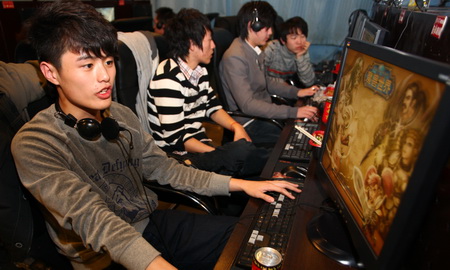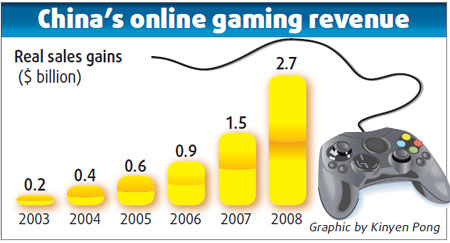Top Biz News
Battle breaks out over online game WoW
By Hu Yinan and Wang Xing (China Daily)
Updated: 2009-11-04 08:21
 A young man plays World of Warcraft in an Internet cafe in Beijing yesterday. [China Daily] |
In a rare turf war between regulatory agencies, the Ministry of Culture (MOC) yesterday opened fire on the General Administration of Press and Publications (GAPP), saying its decision to pull the plug on a popular online game was "an act out of bounds".
The firefight broke out after GAPP decided Monday night to suspend its approval of the World of WarCraft online game. The game has more than 1 million players on the Chinese mainland.
In effect, the GAPP decision ran against a State Council circular issued last July that declared the MOC was in charge of regulating the multi-billion dollar online gaming industry.
GAPP had previously overseen the industry.
It has ordered NetEase.com, China's second-largest Internet games operator and the company with the license to run World of WarCraft in China, not to charge users. GAPP has also told the company to power off its servers and refuse to accept new account registrations.
GAPP is responsible for reviewing and approving "publications" and the department contends that online games are a form of "online publication".
The MOC insists online games are within its portfolio.
The MOC called an emergency press briefing yesterday afternoon in Beijing to respond to GAPP's decision to suspend approval on the popular online game.
Li Xiong, head of the MOC's department of cultural markets, insisted the ministry had the sole right to regulate online games.
"As long as they're online, these online games and publications are fully subject to administration by the MOC," Li said.
Nasdaq-listed NetEase is "complete in its paperwork and the content of its game is legitimate", Li said, insisting that GAPP should not have become involved and blocked the game.
GAPP had earlier threatened to cut NetEase's Internet service, something that Li said it was not authorized to do.
The MOC will report relevant matters to the State Council, added Liu Qiang, chief of its Internet culture division.
GAPP allowed NetEase to begin testing World of WarCraft on July 30 on the condition that it did not charge gamers and did not allow the registration of new accounts. But NetEase allegedly began to break those conditions on Sept 19.
GAPP responded on Monday evening by saying it had pulled approval of the game.
In a written statement, NetEase said Tuesday it had not been officially notified of GAPP's decision. The company said it was "currently seeking clarification" from the relevant authorities.
Officials from GAPP could not be reached for comment on Tuesday.

Experts have described China's online gaming industry as one of the nation's most promising sectors. The nation's online gaming industry took in around 2.7 billion yuan ($395.6 million) last year, according to official statistics.
China had 217 million online gamers by June.
Zhang Chao, 28, who has been a World of WarCraft player for five years, said the dispute was "a show of the intensity of conflict between government agencies whose roles have not been clearly defined".
"Of course, players like us wouldn't want to see the game suspended. This looks as if they're just messing around with things over a conflict of interest," Zhang said.
A 29-year-old worker at an online advertising agency, who would only give her cyber name, Xiaoyun, said she plays for around 4 hours a day. She said many online gamers will play via servers in Taiwan, where they will have to spend about twice as much.
"I don't care which government agency is overseeing online games. But whoever it is, they never come to us for our opinion," she said. "The players are the biggest victims."
Chen Jia and Chen Limin contributed to the story













